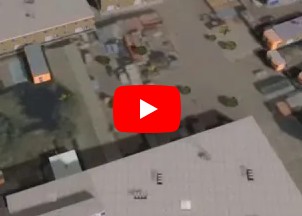How to export a DXF: Difference between revisions
Jump to navigation
Jump to search

No edit summary |
No edit summary |
||
| Line 1: | Line 1: | ||
[[DXF]] Files can be exported from the Tygron Platform directly to be used as a base in an AutoCAD Drawing. | [[DXF]] Files can be exported from the Tygron Platform directly to be used as a base in an AutoCAD Drawing. | ||
Exporting from Tygron directly instead of starting from scratch in AutoCAD will give the user the following benefits: | |||
* Objects like [[Buildings]] and roads will be exported to the [[DXF]] file so that the user has a context of his surroundings in AutoCAD. | |||
* The [[DXF]] file is Geo Geo-referenced to the project CRS. | |||
* AutoCAD layers are automatically generated based on the Geo Plugin used in Tygron so that when importing the design back to Tygron, the layers will match the Tygron Functions, and the AutoCAD design is shown directly in 3D and its properties can be used for calculations in Tygron. | |||
The video below explains how this works. | The video below explains how this works. | ||
| Line 6: | Line 12: | ||
{{howto|title=export a DXF for use in AutoCAD | {{howto|title=export a DXF for use in AutoCAD | ||
| Make sure that a Geo Plugin is present in your project. To learn more about Geo Plugins check out the [[Geo Plugin]] page. | | Make sure that a Geo Plugin is present in your project. To learn more about Geo Plugins check out the [[Geo Plugin]] page. | ||
| Select "Export AutoCAD DXF reference" from the [[Geo Plugins]]drop down menu. | | Select "Export AutoCAD DXF reference" from the [[Geo Plugins]] drop down menu. | ||
| In the export dialog leave the two default attributes as is but make sure that you select a valid CRS for the area you will be working in. | | In the export dialog leave the two default attributes as is but make sure that you select a valid CRS for the area you will be working in. | ||
| Choose the right Geo Plugin from the drop down list. This will be used to generate the [[DXF]] layers when exporting. | | Choose the right Geo Plugin from the drop down list. This will be used to generate the [[DXF]] layers when exporting. | ||
| Line 17: | Line 23: | ||
{{article end | {{article end | ||
| howtos= | | howtos= | ||
* [[How to set the unit of measurement for a DXF]] | * [[How to set the unit of measurement for a DXF]] | ||
* [[How to deal with a long processing DXF import]] | * [[How to deal with a long processing DXF import]] | ||
}} | }} | ||
Revision as of 09:18, 29 March 2023
DXF Files can be exported from the Tygron Platform directly to be used as a base in an AutoCAD Drawing. Exporting from Tygron directly instead of starting from scratch in AutoCAD will give the user the following benefits:
- Objects like Buildings and roads will be exported to the DXF file so that the user has a context of his surroundings in AutoCAD.
- The DXF file is Geo Geo-referenced to the project CRS.
- AutoCAD layers are automatically generated based on the Geo Plugin used in Tygron so that when importing the design back to Tygron, the layers will match the Tygron Functions, and the AutoCAD design is shown directly in 3D and its properties can be used for calculations in Tygron.
The video below explains how this works.
How to export a DXF for use in AutoCAD:
- Make sure that a Geo Plugin is present in your project. To learn more about Geo Plugins check out the Geo Plugin page.
- Select "Export AutoCAD DXF reference" from the Geo Plugins drop down menu.
- In the export dialog leave the two default attributes as is but make sure that you select a valid CRS for the area you will be working in.
- Choose the right Geo Plugin from the drop down list. This will be used to generate the DXF layers when exporting.
- Click on "Export file" when you are ready. A DXF file will be generated based on the Geo Plugin links.
- You can now open the DXF and start designing in AutoCAD.

Video tutorial on exporting a DXF file Project.